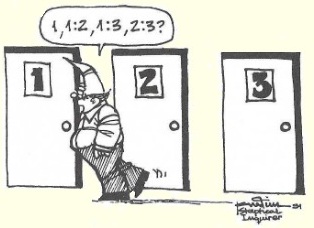 The following "brain teaser" was submitted to vos Savant last year by a reader:
The following "brain teaser" was submitted to vos Savant last year by a reader:
|
This site's URLs are case sensitive (GoDaddy hosts it on a Linux server). Not optimized for mobile devices (may display formatting irregularities). |
The following column, published in Skeptical Inquirer, Summer 1991 (see pp. 342-345 here),
evoked more letters to the editor than had any other in the magazine's then-15-year history (see here).
And Martin Gardner begins Chapter 1 of
his 1996 book Weird Water and Fuzzy Logic with this column
on pp. 11-14 of the book (Kendrick Frazier wrote only the "Editor's Postscript" immediately following it).
By Gary P. Posner
"When E. F. Hutton talks, people listen." Who can forget those indelible television commercials in which the world came to a virtual standstill, focusing its sole attention upon that oracle of financial wisdom (that is, before Hutton went belly-up)? As a rule, when Marilyn vos Savant speaks in her weekly Parade magazine column, "Ask Marilyn" (her byline notes that she "is listed in the 'Guinness Book of World Records Hall of Fame' for 'Highest IQ'"), people listen. In the instance discussed below, however, they may have been listening, but they weren't believing -- although they should have been.
 The following "brain teaser" was submitted to vos Savant last year by a reader:
The following "brain teaser" was submitted to vos Savant last year by a reader:
Suppose you're on a game show, and you're given a choice of three doors. Behind one door is a car; behind the others, goats. You pick a door -- say,No. 1 -- and the host, who knows what's behind the doors, opens another door -- say,No. 3 -- which has a goat. He then says to you,"Do you want to pick doorNo. 2?" Is it to your advantage to switch your choice?
In her column, vos Savant answered, "Yes, you should switch." She explained that, obviously, there
is a 1:3 chance that the original choice, door
Apparently not, based upon the chastising letters vos Savant received from those who ought to know better -- mathematicians who share CSICOP's dismay over the nation's state of "innumeracy." In a follow-up column last December, vos Savant published some examples:
I'm very concerned with the general public's lack of mathematical skills. Please help by confessing your error.
--Robert Sachs, Ph.D., George Mason UniversityYou blew it, and you blew it big!
. . . You seem to have difficulty grasping the basic principle at work here.. . . There is enough mathematical illiteracy in this country, and we don't need the world's highest IQ propagating more. Shame!
--Scott Smith, Ph.D., University of FloridaYour answer to the question is in error. But if it is any consolation, many of my colleagues have also been stumped by this problem.
--Barry Pasternack, Ph.D., California Faculty Association
In an effort to even more clearly illustrate the correctness of her original answer, vos Savant invoked the classic "shell game," in which a pea is placed beneath one of three shells. The gambler/victim is asked to place a finger on one shell, and the "house" then lifts away one of the others, leaving behind two shells, one of which covers the pea. As vos Savant explained, by removing one empty shell "we've learned nothing to allow us to revise the odds on the shell under your finger." She then presented a "probability grid" containing all possible permutations of the game, showing how "when you don't switch, you win one in three times and lose two in three. Try it yourself." (The "shell game" is illegal precisely because, despite the appearance of 50:50 odds, they actually favor the "house" 2:1.)
One might have thought, or at least hoped, that this second column would have settled the issue. But in her February 17, 1991, column, we were treated to the following:
I am in shock that after being corrected by at least three mathematicians, you still do not see your mistake.
--Kent Ford, Dickinson State UniversityAlbert Einstein earned a dearer place in the hearts of the people after he admitted his errors.
--Frank Rose, Ph.D., University of MichiganYour answer is clearly at odds with the truth.
--James Rauff, Ph.D., Millikin UniversityMay I suggest that you obtain and refer to a standard textbook on probability.
--Charles Reid Ph.D., University of FloridaI am sure you will receive many letters from high school and college students. Perhaps you should keep a few addresses for help with future columns.
--W. Robert Smith, Ph.D., Georgia State UniversityYou are utterly incorrect.
. . . How many irate mathematicians are needed to get you to change your mind?
--E. Ray Bobo, Ph.D., Georgetown UniversityIf all those Ph.D.s were wrong, the country would be in very serious trouble.
--Everett Harman, Ph.D., U.S. Army Research InstituteMaybe women look at math problems differently than men.
--Don Edwards, Sunriver, Oregon
"When reality clashes so violently with intuition," vos Savant responded, "people are shaken." In
once again addressing the question "Should you switch?" she apparently decided this time to invoke a
more universally accepted phenomenon. Suppose, she says, after choosing door
And if that isn't sufficiently clear, vos Savant asks the nation's math teachers to perform 400 trials of the "shell game" with their students, the first 200 with no "switching," followed by 200 "switches," with random selections to be made by rolling a die until a 1, 2, or 3 comes up. Even if no "little green woman" arrives in a UFO to supervise the trials, I predict a few red faces on those math instructors who will not see the light until the results of the trials are tallied.
[Cartoon by Rob Pudim for Skeptical Inquirer. Readers are also referred to Innumeracy: Mathematical Illiteracy and Its Consequences, by John Paulos (Hill and Wang, N.Y., 1988).]
And if still not convinced, see
this brief video for an easy-to-follow explanation.
|
|
|
|
|
|
|
|